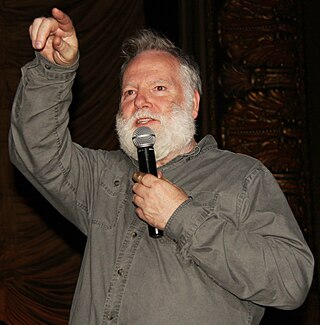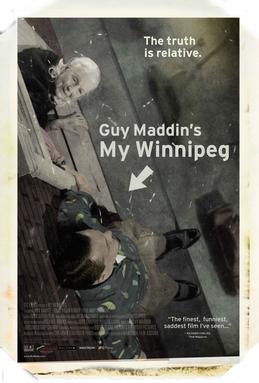Related Research Articles

Guy Maddin is a Canadian screenwriter, director, author, cinematographer, and film editor of both features and short films, as well as an installation artist, from Winnipeg, Manitoba. Since completing his first film in 1985, Maddin has become one of Canada's most well-known and celebrated filmmakers.

Night Heat is a Canadian police crime drama series that aired on both CTV in Canada and CBS in the United States. Original episodes were broadcast from 1985 to 1989. Night Heat was the first Canadian original drama series that was also aired on a United States television network during its original broadcast. It was also the first original, first-run drama series to be aired during a late night time slot on a television network in the United States.
Noam Gonick, is a Canadian filmmaker and artist. His films include Hey, Happy!, Stryker, Guy Maddin: Waiting for Twilight and To Russia with Love. His work deals with homosexuality, social exclusion, dystopia and utopia.

Geoff Pevere is a Canadian lecturer, author, broadcaster, teacher, arts and media critic, currently the program director of the Rendezvous With Madness Film Festival in Toronto. He is a former film critic, book columnist and cultural journalist for the Toronto Star, where he worked from 1998 to 2011. His writing has appeared in several newspapers, magazines and arts journals, and he has worked as a broadcaster for both radio and television. He has lectured widely on cultural and media topics, and taught courses at several Canadian universities and colleges. In 2012, he contributed weekly pop culture columns to CBC Radio Syndication, which were heard in nearly twenty markets across Canada. He has also been a movie columnist and regular freelance contributor with The Globe and Mail.
The Winnipeg Film Group (WFG) is an artist-run film education, production, distribution, and exhibition centre in Winnipeg, Manitoba, committed to promoting the art of Canadian cinema, especially independent cinema.
Crime Wave, also known as The Big Crime Wave, is a 1985 Canadian independent surrealist comedy film written, produced and directed by Winnipeg-based filmmaker John Paizs.
The Academy of Canadian Cinema and Television presents an annual award for Best Performance by an Actor in a Leading Role to the best performance by a lead actor in a Canadian film. The award was first presented in 1968 by the Canadian Film Awards, and was presented annually until 1978 with the exception of 1969, when no eligible feature films were submitted for award consideration, and 1974 due to the cancellation of the awards that year.
The Academy of Canadian Cinema & Television presents an annual award for Best Performance by an Actress in a Leading Role to the best performance by a lead actress in a Canadian film. The award was first presented in 1968 by the Canadian Film Awards, and was presented annually until 1978 with the exception of 1969, when no eligible feature films were submitted for award consideration, and 1974 due to the cancellation of the awards that year.
The Academy of Canadian Cinema and Television presents an annual award for Best Performance by an Actor in a Supporting Role to the best performance by a supporting actor in a Canadian film. The award was first presented in 1970 by the Canadian Film Awards, and was presented annually until 1978 with the exception of 1974 due to the cancellation of the awards that year.
The Academy of Canadian Cinema and Television presents an annual award for Best Performance by an Actress in a Supporting Role to the best performance by a supporting actress in a Canadian film. The award was first presented in 1970 by the Canadian Film Awards, and was presented annually until 1978 with the exception of 1974 due to the cancellation of the awards that year.

My Winnipeg is a 2007 Canadian film directed and written by Guy Maddin with dialogue by George Toles. Described by Maddin as a "docu-fantasia", that melds "personal history, civic tragedy, and mystical hypothesizing", the film is a surrealist mockumentary about Winnipeg, Maddin's home town. A New York Times article described the film's unconventional take on the documentary style by noting that it "skates along an icy edge between dreams and lucidity, fact and fiction, cinema and psychotherapy".
The Academy of Canadian Cinema and Television presents an annual award for Best Comedy Series.

Louis Negin was a British-born Canadian actor, best known for his roles in the films of Guy Maddin.

The 9th Toronto International Film Festival (TIFF) took place in Toronto, Ontario, Canada between September 6 and September 15, 1984. The festival introduced Perspective Canada programme, devoted to Canadian films. The festival screened 225 feature films and more than half of them were Canadian films.
The Rogers Best Canadian Film Award is presented annually by the Toronto Film Critics Association to the film judged by the organization's members as the year's best Canadian film. In 2012, the cash prize accompanying the award was increased to $100,000, making it the largest arts award in Canada. Each year, two runners-up also receive $5,000. The award is funded and presented by Rogers Communications, which is a founding sponsor of the association's awards gala.
The Academy of Canadian Cinema and Television presents an annual award for Best Feature Length Documentary. First presented in 1968 as part of the Canadian Film Awards, it became part of the Genie Awards in 1980 and the contemporary Canadian Screen Awards in 2013.
Deco Dawson is the professional name of Darryl Kinaschuk, a Ukrainian Canadian experimental filmmaker. He is most noted as a two-time winner of the Toronto International Film Festival Award for Best Canadian Short Film, winning at the 2001 Toronto International Film Festival for FILM(dzama) and at the 2012 Toronto International Film Festival for Keep a Modest Head, and was a shortlisted Canadian Screen Award nominee for Best Short Documentary for the latter film at the 1st Canadian Screen Awards in 2013.
Evan Johnson is a Canadian filmmaker from Winnipeg, Manitoba, most noted for his frequent collaborations with Guy Maddin. He was codirector of Maddin's The Forbidden Room, which was the winner of the Toronto Film Critics Association's Rogers Best Canadian Film Award at the Toronto Film Critics Association Awards 2015.
The Three Worlds of Nick is a Canadian anthology film, comprising John Paizs's short film trilogy of Springtime in Greenland (1981), Oak, Ivy, and Other Dead Elms (1982) and The International Style (1983). The films all starred Paizs as Nick, a "quiet man" who never speaks in any of the three films, but is placed in very different scenarios which each represent a different genre of film; Paizs described the character as "a Buster Keaton-like character in the sound era", and named him after Ernest Hemingway's recurring semi-autobiographical Nick Adams character.
References
- ↑ Geoffrey York, "Waiting it out in Winnipeg". The Globe and Mail , January 30, 1987.
- ↑ Jay Scott, "Half-cooked Crime Wave". The Globe and Mail , September 14, 1985.
- ↑ Liam Lacey, "Something wild in Winnipeg". The Globe and Mail , January 26, 1991.
- ↑ "Manitoba's paths of gory". New York Daily News , September 5, 1990.
- ↑ Morley Walker, "Childhood memories spawn film". Winnipeg Sun , February 13, 1981.
- 1 2 Morley Walker, "Gutsy Paisz is getting better". Winnipeg Sun , November 24, 1983.
- 1 2 3 Jonathan Ball, John Paizs's Crime Wave. University of Toronto Press, 2014. ISBN 9781442616172. Chapter "Beginnings and Endings", pp. 33-63.
- 1 2 Norman Wilner, "Paizs's genre gambles pay off". Now , April 10, 2008.
- ↑ Nicholas Sokic, "Playback’s 10 to Watch 2024: Gillian McKercher". Playback , October 1, 2024.
- ↑ Andrew Parker, "Salute Canada’s Top Ten Shorts". TheGATE.ca , January 10, 2017.